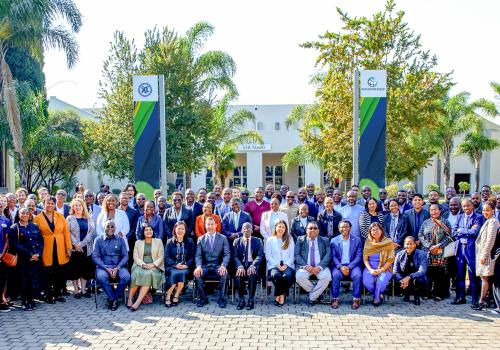Member States of the Southern African Development Community (SADC) have reaffirmed their commitment to leveraging Mobile Phone Data (MPD) to overcome challenges associated with traditional methods of collecting statistics by National Statistical Offices (NSOs). These sentiments were shared during the Regional Workshop on Putting Mobile Phone Data to Work for SADC Statistics, convened from 19 to 22 May 2025 in Johannesburg, Republic of South Africa.
Member States emphasised the pivotal role of statistics in regional integration and socio-economic development. High-quality, timely data is essential for informed decision-making, effective policy implementation, and monitoring progress toward regional and national development goals.
Mr. James Mutandwa Madya, Deputy Director for Policy and Strategic Planning in the Ministry of ICT, Postal and Courier Services and representative of the Republic of Zimbabwe, the Chair of SADC, highlighted the need to integrate MPD into National Statistical Systems (NSS). He underscored the importance using MDP for quality statistics in informing policy development and service delivery to support sustainable growth, regional infrastructure development, and economic integration towards a data-driven future. Mr. Madya reiterated that the objectives of the workshop aligned with the SADC Regional Indicative Strategic Development Plan (RISDP) 2020–2030 and the SADC Vision 2050.
He further stressed the importance of regional collaboration and the harmonisation of data collection practices, emphasising that consistency and comparability are key to producing reliable and actionable statistics. Mr. Madya called for enhanced support for SADC’s digital initiatives, including the Digital Inclusion for All Framework, SADC Digital Transformation Strategy (DTS), Big Data Framework, and the SADC ICT Observatory, all of which stand to benefit significantly from MPD integration.
Dr. George Ah-Thew, the SADC Senior Programme Officer for ICT, expressed enthusiasm of the high-level participation and active engagement from both the public and private sectors in the MPD ecosystem. He highlighted the involvement of critical institutions, including Ministries of ICT, National Regulatory Authorities (NRAs), National Statistical Offices (NSOs), Data Protection Agencies (DPAs), and Mobile Network Operators (MNOs), in supporting the growing use of mobile phone data across the region.
Dr. Ah-Thew emphasised that the widespread adoption of mobile technology is a key enabler for the MPD initiative, opening up new opportunities for enhancing official statistics in areas such as population mobility, traffic and transport planning, disaster and emergency response, tourism, and migration analysis. He noted that, as of 2024, mobile penetration in the SADC region stood at 95.2%, with seven Member States surpassing the 100% mark, underscoring the region's readiness to leverage MPD for development and policy-making purposes.
He remarked that while businesses have long utilised MPD to drive innovation and efficiency, the strategic use of this data is now becoming an increasing priority for governments and international organisations alike.
He further encouraged Member States to prioritise MPD as a critical data resource as it presents benefits for real-time, disaggregated data collection, making statistical production more cost-effective and responsive to development needs. This, he said, would significantly strengthen NSOs and policy formulation processes.
Speaking on behalf of the World Bank Group, Ms. Maria Gabriela Farfan Betran, Senior Economist, applauded SADC’s proactive uptake of the MPD initiative. She referenced the World Bank’s Global Data Facility (GDF), which six (6) months prior launched a new support window to enhance MPD use in statistics and policymaking. Ms. Betran reaffirmed the World Bank’s commitment to supporting SADC through programmatic assistance aimed at building local capacity and integrating MPD into national data ecosystems.
She further commended the collaboration between the SADC Secretariat and the World Bank Group, highlighting the GDF’s role in catalyzing additional funding to ensure the initiative’s long-term sustainability. The partnership aims to strengthen statistical capacity and digital public infrastructure in the region. The World Bank launched the SADC GDF-MPD Seed Grants to enable recipient SADC Member States to develop MPD institutional arrangements as for the Pre-Foundation phase. Member States were invited to submit their MPD Project Expression of Interest (EoI) by 30th June and for the Grants to be awarded in September 2025. This is an exciting time for SADC in the use of MPD.
Mr. Deepchandsingh Jagai, SADC Senior Programme Officer for Statistics urged Member States to promote innovation within the wider data ecosystem as part of modernising and transforming statistical systems to be responsive to increasing data demands. He stated that Big Data sources such as MPD complements traditional data collection methods thereby giving impetus to quick release of statistics to users and the added advantage of being more cost-efficient in its execution.
The MPD initiative is part of the broader SADC Regional Statistics Project, funded with the support of the World Bank Group. The project promotes strengthening the institutional capacity of SADC Member States to produce, disseminate and use high quality statistics while increasing regional harmonization and collaboration across the SADC region.
The four-day workshop aimed to deepen understanding of MPD’s potential and develop practical strategies for its use. Participants engaged in capacity-building sessions, hands-on training, technical work and the development of country-specific Action Plans to integrate MPD into national statistical systems. The workshop also addressed policy alignment and implementation planning for MPD, equipping participants with the expertise required for successful adoption.
The workshop culminated with four (4) technical workshops which showcased comprehensive use of MPD for population statistics, measuring on Internet usage, Real-Time Monitoring of Welfare, population migration and Artificial Intelligence (AI) for NSOs.
The workshop was attended by government officials from the ICT sector, ICT NRAs, NSOs, MNOs, DPAs, SADC ICT Implementing Agencies, namely CRASA, SATA and SAPOA, as well as representatives from implementing partners including the World Bank Group, the Global Partnership for Sustainable Development Data (GPSDD) and the World Bank’s Global Data Facility – Mobile Phone Data Programme (GDF-MPD) (Partnership includes WBG institutional partners from Development Economics, Poverty, and Digital Transformation, and the International Telecommunication Union (ITU).

